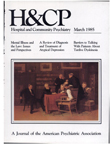Examining the Application of the Guilty but Mentally Ill Verdict in Michigan
Abstract
The insanity defense has come under increased criticism after the highly publicized acquittal of John Hinckley, Jr. A variety of proposals have been suggested to rectify the perceived injustices of an insanity acquittal. In 1975 Michigan passed a guilty but mentally ill statute that allowed for individuals to be found mentally ill at the time of the offense but still criminally responsible for their actions. The authors review the history of the Michigan statute, scrutinize an empirical study of the statute's effectiveness, and debate a number of controversial issues. They suggest that guilty but mentally ill may be a misleading verdict establisbed because of purely political motives.
Access content
To read the fulltext, please use one of the options below to sign in or purchase access.- Personal login
- Institutional Login
- Sign in via OpenAthens
- Register for access
-
Please login/register if you wish to pair your device and check access availability.
Not a subscriber?
PsychiatryOnline subscription options offer access to the DSM-5 library, books, journals, CME, and patient resources. This all-in-one virtual library provides psychiatrists and mental health professionals with key resources for diagnosis, treatment, research, and professional development.
Need more help? PsychiatryOnline Customer Service may be reached by emailing [email protected] or by calling 800-368-5777 (in the U.S.) or 703-907-7322 (outside the U.S.).



